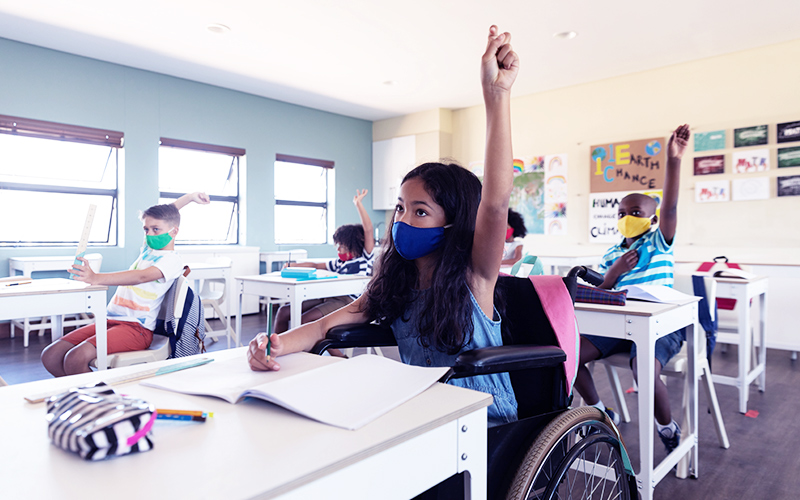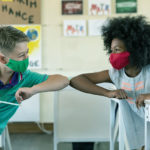Taming reentry anxiety: How to prepare kids for a back-to-school like no other

After more than a year and a half of remote, hybrid, and home-schooling, it’s time to gear up for a return to full-time, in-person school. But for many kids, this “return to normal” comes with a unique set of concerns.
Here, Keneisha Sinclair-McBride, a psychologist in the Department of Psychiatry and Behavioral Sciences, answers questions about how parents can help their children manage reentry anxiety as they head back into the classroom.
Is there a common concern kids seem to have about going back to school this fall?
Suggested reading
Sinclair-McBride recommends the following books to help children from elementary through high school find ways to recognize and manage anxiety and worrisome thoughts:
Breathe Like a Bear: 30 Mindful Moments for Kids to Feel Calm and Focused Anytime, Anywhere.
Stuff That Sucks: A Teen’s Guide to Accepting What You Can’t Change and Committing to What You Can.
“There are a lot of different emotional and health concerns kids might be having this year, but one thing I’m noticing is that a year of remote learning really has had an impact on how kids feel about their academic development,” Sinclair-McBride says. “I’m hearing a lot of, ‘I feel like I didn’t learn as much last year.’”
How parents and caregivers can help:
“Reassure your kids that [almost] everybody’s in the same spot,” Sinclair-McBride advises. “So many kids feel like they didn’t get the full [academic] experience last year, but teachers understand this.”
Sinclair-McBride encourages having your child focus on getting any summer reading or work done, and if possible, contact their teacher before the school year begins to find out if there are books or material they could preview. This may help prepare them for the subjects they’re going to study, so they’ll feel that they already have some understanding when the year starts. Reducing uncertainty can help with anxiety.
“I often tell kids that it’s their teacher’s job to help them learn,” she adds. “They want you to succeed, and they want to support you, so don’t be afraid to ask them for help.”
What worries might kids be having about the social aspect of school?
While many kids are excited to be back with their peers and teachers, others may feel overwhelmed by a new social environment. In addition, the social dynamics of school can be especially hard for children who’ve experienced social anxiety or bullying before the pandemic.
“It was often easier at home [with remote learning] to just focus on your own group of friends,” Sinclair-McBride says. “Remote learning allowed kids to avoid certain social situations that made them uncomfortable, and kids who might have been dealing with bullying may have had a sort of break from that.”
She suggests parents partner with their child’s school and teachers to address anxieties or social concerns before going back.
“Be honest with the staff,” she says. “Tell them if your child has had a history of victimization, and don’t hesitate to ask them to help come up with a plan to mitigate the threat of adverse situations before the year starts.
It’s important for kids to know that anxiety is a normal part of life,” says Sinclair-McBride. “It can be a tool that tells us that we need to change our behavior to keep ourselves safe. But when anxiety gets to be too overwhelming, it means that we can’t do what we want and need to do. And that’s when you need to get some help.
Keneisha Sinclair-McBride
Sinclair-McBride also suggests talking through or acting out potential scenarios to help kids problem solve and plan ahead. For example, ask your child what they would do if they get to the cafeteria and are nervous about where to sit. Then suggest they plan with a friend to sit together on the first few days of school.
What signs should a parent look for that may indicate their child isn’t coping well with going to back school?
There are some things to look for that might signal that your child needs extra support:
- increased sadness, irritability, noncompliance
- isolation from family or friends
- disinterest in usual or preferred activities
- not wanting to go to school or finding reasons to miss school
- avoiding schoolwork
- talking about hurting themselves or suicide
If you notice any of these or other troubling signs, Sinclair-McBride urges you to seek emergency support if needed and check in with your pediatrician or a behavioral health specialist.
What is some general advice for parents to help prepare their family for back-to-school?
Sinclair-McBride keeps her advice simple:
Be empathetic and relatable
Whatever your child may be feeling when it comes to going back to school, Sinclair-McBride stresses that it’s important to recognize that this year will feel like a significant transition and that it can take time to settle back in.
“Acknowledge the universality of the [pandemic] experience,” she says. “Try sharing about how you may have been apprehensive about working from home or nervous about how safe you’d be going back into the office. Also, encourage them to join you in practicing coping strategies: deep breathing, exercise, crafting, etc., to support healthy anxiety management.”
Be a safe space for your children to talk about how they’re feeling, and validate whatever those feelings may be.
Be supportive yet realistic
“We can’t predict the future and we can’t control uncertainty,” says Sinclair-McBride. “But we can embrace it.”
“Help your child focus on the positive,” she adds. “This [school year] is an opportunity to get back on track with sports or theater or whatever your child’s “normal” is. Encourage them to see this as an opportunity to move forward even while things are still so complicated. It’s important to remind kids that all they can do is do their best.”
For more information and resources about parenting during the pandemic, see Boston Children’s response to COVID-19.
Related Posts :
-

Back to school… back to what?
This month, many children and teens in Massachusetts and around the country are finally heading back to school in person. ...
-

Answers to six questions about anxiety in children and teens
Between school and social demands, lots of children feel stress, but at what point does anxiety cross the line and ...
-

New research shows caregiver instability affects development
According to some estimates, more than 100 million children around the world experience separations from their caregiver every year. Previous research — ...
-

Team spirit: How working with an allergy psychologist got Amber back to cheering
A bubbly high schooler with lots of friends and a passion for competitive cheerleading: On the surface, Amber’s life ...





